Chinese New Year, also known as Lunar New Year or Spring Festival, is the most important festival in China and a major event in some other East Asian countries.
Chinese New Year is the festival that celebrates the beginning of a new year on the traditional Chinese lunisolar calendar. Chinese New Year 2026 will fall on Tuesday, February 17th. The date changes every year but is always somewhere in the period from January 21st to February 20th.
It was traditionally a time to honor deities and ancestors, and it has also become a time to feast and visit family members.
Content Preview
Chinese New Year Traditions and Celebrations
Regional customs and traditions vary widely but share the same theme: seeing out the old year and welcoming in the luck and prosperity of a new year. The main Chinese New Year activities include
- putting up decorations,
- offering sacrifices to ancestors,
- eating reunion dinner with family on New Year’s Eve,
- giving red envelopes and other gifts,
- firecrackers and fireworks, and
- watching lion and dragon dances.
1. Cleaning and Decorating Houses with Red Things
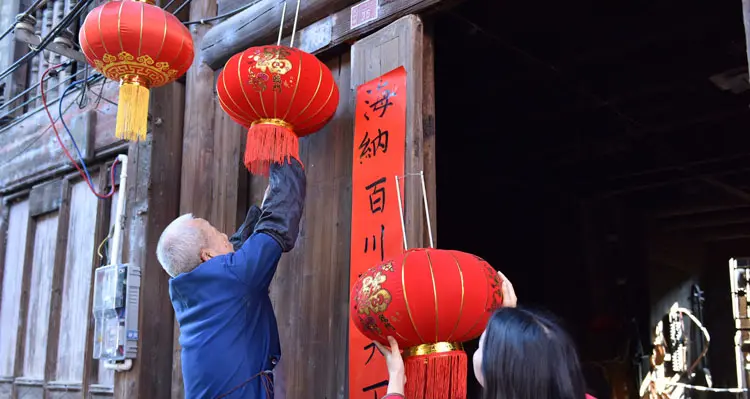
People give their houses a thorough cleaning before the Spring Festival, which symbolizes sweeping away the bad luck of the preceding year and making their homes ready to receive good luck.
Red is the main color for the festival, as red is believed to be an auspicious color for the Lunar New Year, denoting prosperity and energy — which ward off evil spirits and negativity. Red lanterns hang in streets; red couplets and New Year pictures are pasted on doors.
2. Offering Sacrifices to Ancestors
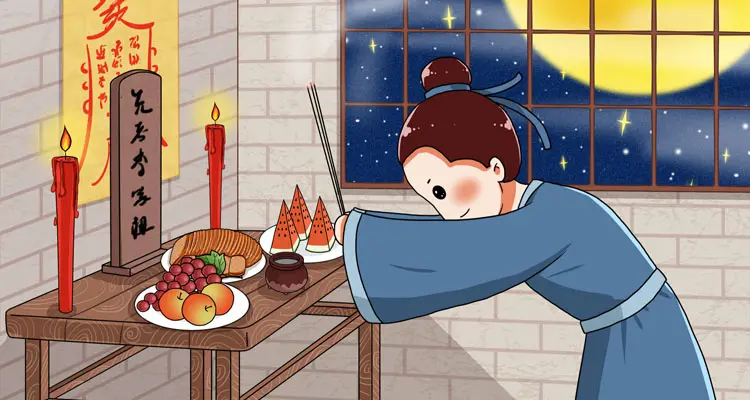
Honoring the dead is a Chinese New Year’s tradition that’s kept to the word. Many Chinese people visit ancestors’ graves on the day before the Chinese New Year’s day, offer sacrifices to ancestors before the reunion dinner (to show that they are letting their ancestors “eat” first), and add an extra glass and place it at the dinner table on New Year’s eve.
3. Enjoying a Family Reunion Dinner on Lunar New Year’s Eve
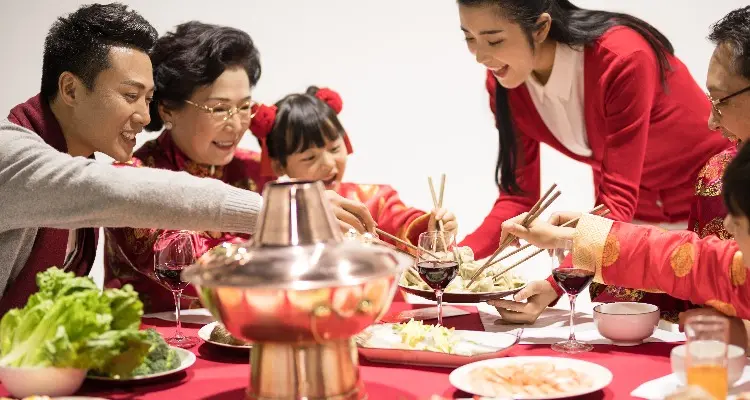
Chinese New Year (Lunar New Year) is a time for families to be together. Chinese New Year’s Eve is the most important time. Wherever they are, people are expected to be home to celebrate the festival with their families. The Chinese New Year’s Eve dinner is called ‘reunion dinner‘. Big families of several generations sit around round tables and enjoy the food and time together.
4. Exchanging Red Envelopes and other Gifts
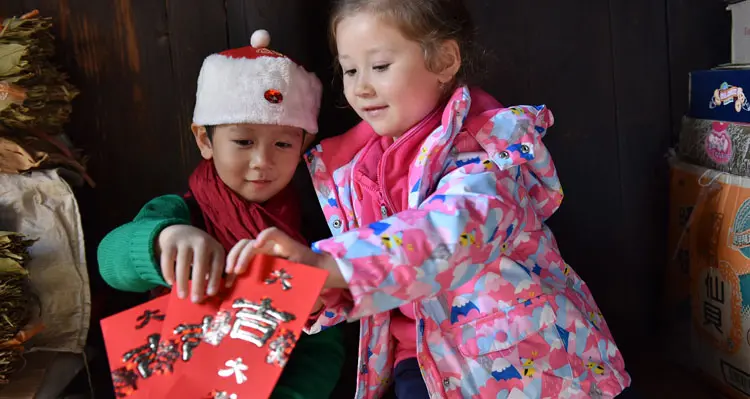
Chinese New Year is a season of red envelopes (or red packets, lìshì or lai see in Cantonese). Red envelopes have money in, and are often given to children and (retired) seniors.
The red envelope (money) is called ya sui qian (压岁钱 /yaa sway chyen/), which means ‘suppressing Sui [the demon]money’. Those who receive a red envelope are wished another safe and peaceful year.
Other popular Lunar New Year gifts are alcohol, tea, fruits, and candies.
See more on:
- Who You Should Give Red Envelopes to and How Much to Give
- Best Chinese New Year Gift Ideas for Friends, Parents, Kids
- 10 Things You Should Not Give as a Chinese New Year Gift
5. Setting Off Firecrackers and Fireworks
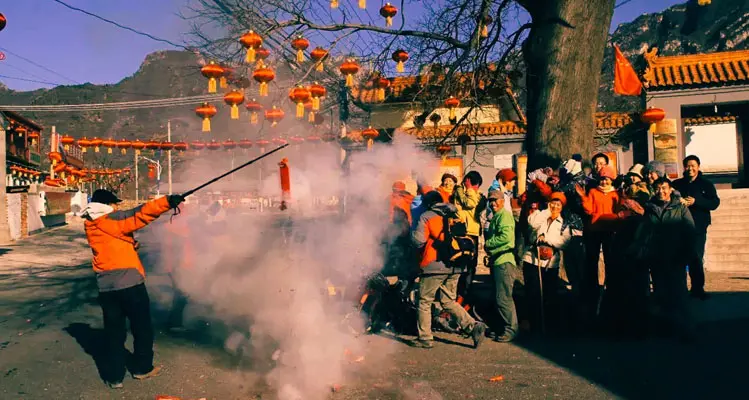
From public displays in major cities to millions of private celebrations in China’s rural areas, setting off firecrackers and fireworks is an indispensable festive activity. It is a way to scare away the evil and welcome the new year’s arrival.
Billions of fireworks go up in China at 12 am and in the first minutes of Chinese New Year, the most anywhere at any time of year.
- See more on Why Chinese New Year Must Have Firecrackers.
6. Watching Lion and Dragon Dances
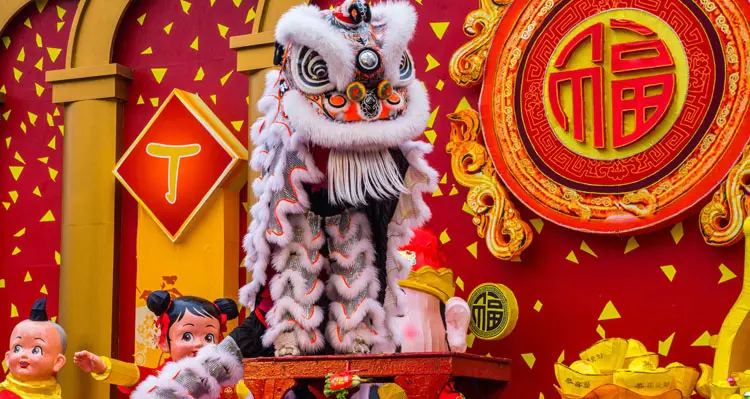
Lion dances and dragon dances are widely seen in China and Chinatowns in many Western countries during the Lunar New Year period. They are performed to bring prosperity and good luck for the upcoming year or event.
There are more Chinese New Year traditions and customs, such as wearing new clothes, staying up late on Chinese New Year’s Eve, watching the Spring Festival Gala, etc.
How Long Is Chinese New Year Celebrations?
Celebrations of Chinese New Year traditionally last for 16 days, starting from Chinese New Year’s Eve to the Lantern Festival. The public holiday in 2026 is from February 15th to February 22nd, lasting 8 days.
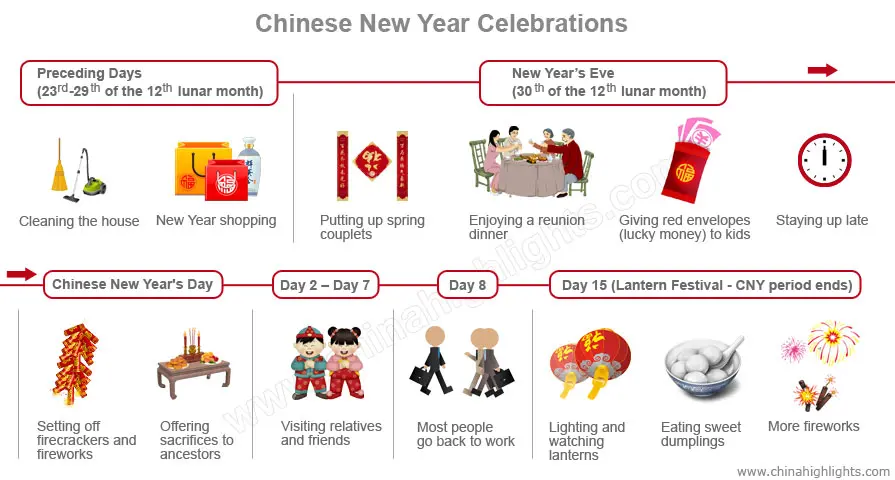
The most notable dates of the Chinese New Year 2026 are these days:
| Solar Date (2026) | Title | Activities |
|---|---|---|
| Feb. 10th | Little Year (小年 Xiǎonián) | Thorough house-cleaning and cooking |
| Feb. 16th | Chinese New Year’s Eve (除夕 Chúxì) | Visiting ancestors’ graves, enjoying the family reunion dinner, giving red envelopes, staying up until midnight, and setting off firecrackers and fireworks |
| Feb. 17th | Chinese New Year’s Day 初一 (Chūyī) | Visiting/greeting family and relatives, and giving presents |
| Mar. 3rd | Lantern Festival (元宵节 Yuánxiāojié) | Marks the end of the festival. Lanterns, dragon dances… |
Chinese New Year Food
- Fish is a must as it sounds like ‘surplus’ in Chinese and symbolizes abundance.
- Dumplings shaped like Chinese silver ingots are shared as a sign of the family unit and prosperity.
- Niángāo (glutinous rice cake) is welcome because it symbolizes a higher income or position as it sounds like ‘year high’.
Food is an important part of Chinese New Year. Lucky food is served during the 16-day festival season, especially on the New Year’s Eve family reunion dinner.
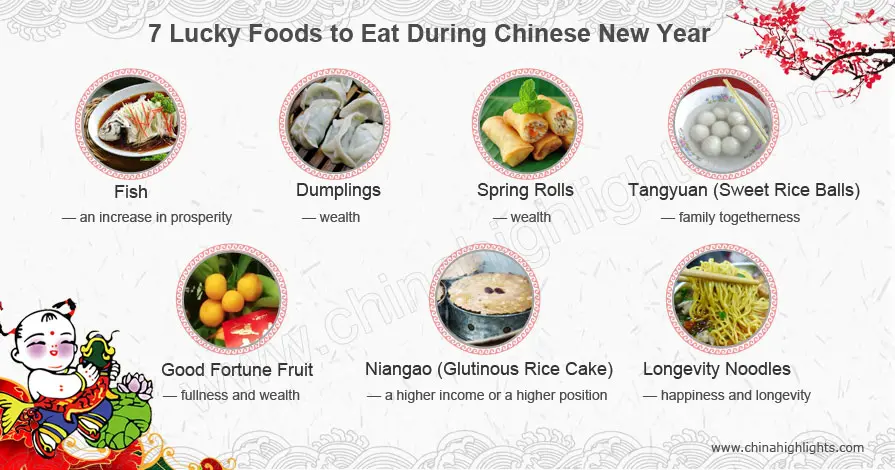
Read more on:
- 7 Lucky Chinese New Year Foods
- The Top 11 Chinese New Year Desserts
- Top 7 Chinese New Year Snacks
- Chinese New Year Fruits
2026 Chinese Zodiac Animal: Fire Horse
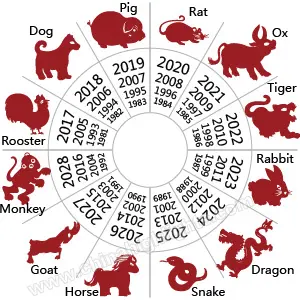
Each Chinese year is associated with an animal sign according to the Chinese zodiac cycle. 2026 is the year of the Horse, specifically, Fire Horse.
| Year | Date of Chinese New Year | Animal Sign |
|---|---|---|
| 2026 | February 17 | Horse |
| 2027 | February 6 | Goat |
| 2028 | January 26 | Monkey |
| 2029 | February 13 | Rooster |
| 2030 | February 3 | Dog |
| 2031 | January 23 | Pig |
| 2032 | February 11 | Rat |
| 2033 | January 31 | Ox |
| 2034 | February 19 | Tiger |
| 2035 | February 8 | Rabbit |
Chinese New Year Superstitions: Things You Mustn’t Do
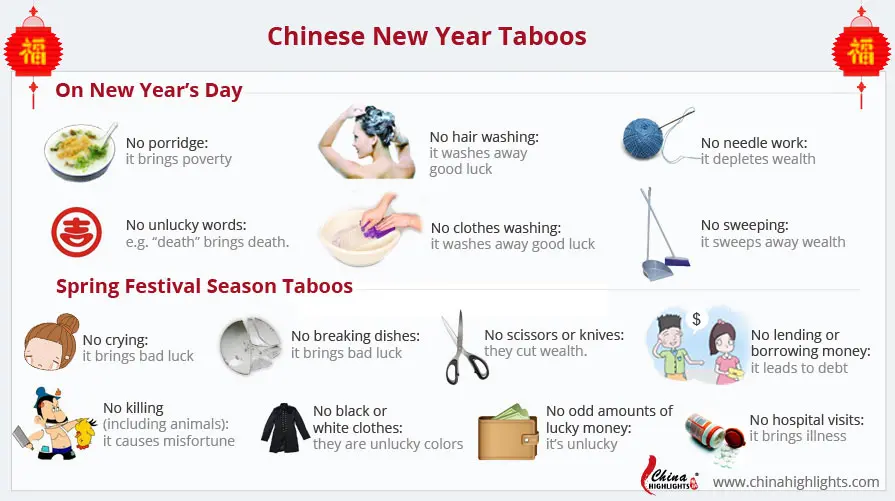
Chinese people traditionally believe that the year’s start affects the whole year, so China’s Spring Festival is a season of superstitions. It’s believed that what something looks like (color, shape), and what its name sounds like, gives it auspicious or ill-fated significance. There are many things you cannot do:
- Don’t sweep up on New Year’s Day, otherwise you’ll ‘sweep all your luck away’.
- Don’t eat porridge for breakfast, otherwise you’ll ‘become poor in the upcoming year’.
- Don’t wash your clothes and hair (on New Year’s Day), otherwise you’ll ‘wash fortune away’.
See more on Chinese New Year Taboos and Superstitions: Top 18 Things You Should Not Do.
How to Say “Happy Chinese New Year” in Chinese
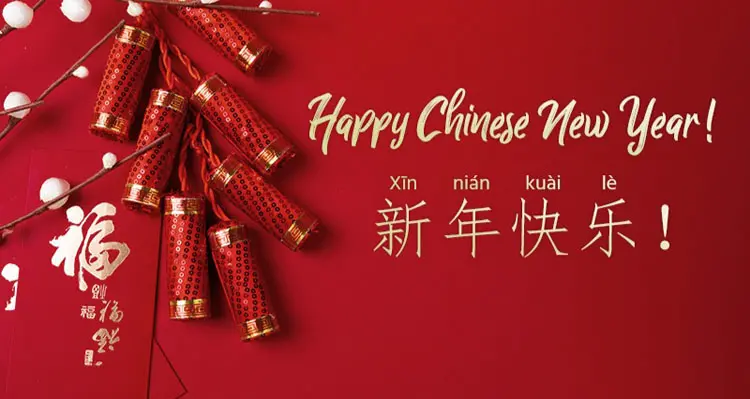
When people meet friends, relatives, colleagues, and even strangers during the festive period, they usually say “Xīnnián hǎo” (新年好), literally meaning ‘New Year Goodness’, or “Xīnnián kuàilè” (新年快乐), meaning ‘Happy Chinese New Year’.
One of the most famous traditional greetings for Chinese New Year is the Cantonese kung hei fat choi, literally ‘happiness and prosperity’. In Mandarin that’s gongxi facai.
新年好 — Happy Chinese New Year
- In Mandarin: xīn nián hǎo /sshin-nyen haoww/
- In Cantonese: san nin hou
恭喜发财 — Happiness and prosperity
- In Mandarin: gōng xǐ fā cái /gong-sshee faa-tseye/
- In Cantonese: gong hay fat choy
For more greetings and wishes, see
- More Ways to Say “Happy New Year” in Chinese (Mandarin and Cantonese)
- 40+ Chinese New Year Greetings and Wishes for Family, Friends, Colleagues, Boss, and Clients
(We encourage you to find creative ways to share the content or images with your friends, family, colleagues, and communities, provided that you acknowledge the copyright along the lines of “Copyright chinahighlights.com.”)
Why Is Chinese New Year Celebrated?
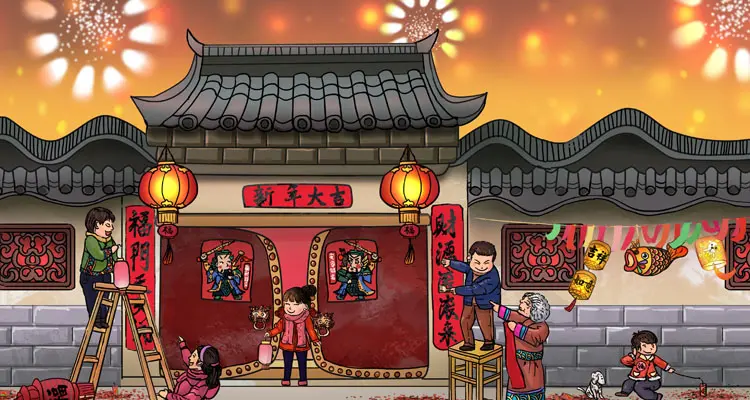
First, legend states that the Chinese New Year stemmed from an ancient battle against the Nian (/nyen/, which sounds the same as ‘year’ in Chinese), a terrifying beast that showed up every Lunar New Year‘s Eve to eat people and livestock. To scare away the monster, people displayed red paper, burned bamboo, lit candles, and wore red clothes. These traditions have been continued until the present time.
Second, it is a celebration of the arrival of spring and the beginning of a new year on the Chinese lunisolar calendar.
Read more on:
Chinese New Year Celebrations in Other Regions and Countries
Chinese New Year is not only celebrated in China’s mainland but also in various other regions and countries influenced by Chinese traditions and with ethnic Chinese populations. Some notable places where Chinese New Year celebrations take place include:
Hong Kong, Macau, and Taiwan: Chinese New Year is a major holiday in these regions, with locals actively participating in customs and traditions.
Taiwan enjoys a 5-holiday from February 16th to February 20th in 2026, while Hong Kong and Macau residents have a 3-day holiday from February 17th to 19th in 2026.
Festivities include vibrant flower markets, street fairs, lantern decorations, and civil servants in Macau being allowed to gamble for three days from the second day of Chinese New Year.
In Chinese Communities around the World
Southeast Asian countries with a significant Chinese population celebrate Chinese New Year with similar traditions.
Singapore and Malaysia observe a 2-day holiday from February 17th to 18th in 2026.
Indonesia has a day public holiday on February 17th in 2026.
Thailand designates Chinese New Year (February 17th in 2026) as a regional public holiday, specifically for the provinces of arathiwat, Pattani, Yala, and Satun.
As for the Philippines, Chinese New Year is recognized as a Special Non-working Holiday.
The United States: Chinese New Year is designated as a 1-day holiday in some states such as New York and Iowa and school districts in San Francisco, Montgomery, and Philadelphia.
Australia: Chinese New Year is officially recognized as a state holiday in Christmas Island. In other places, there are no official holidays, but vibrant celebrations take place within the Chinese communities.
The United Kingdom: Chinese New Year is not a public holiday in the UK, but some educational institutions may arrange 1–2 days holiday to celebrate the festival.
These festivities are often marked by elaborate street parades, lion and dragon dances, Chinese lantern displays, fireworks, and food festivals.














